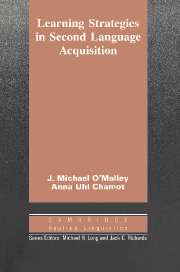Book contents
- Frontmatter
- Contents
- Series editors' preface
- Preface
- 1 Introduction
- 2 A cognitive theory of learning
- 3 How cognitive theory applies to second language acquisition
- 4 Learning strategies: methods and research
- 5 Strategies used by second language learners
- 6 Instruction in learning strategies
- 7 Learning strategies: models and materials
- 8 Summary and conclusions
- Glossary
- References
- Author index
- Subject index
1 - Introduction
Published online by Cambridge University Press: 05 October 2012
- Frontmatter
- Contents
- Series editors' preface
- Preface
- 1 Introduction
- 2 A cognitive theory of learning
- 3 How cognitive theory applies to second language acquisition
- 4 Learning strategies: methods and research
- 5 Strategies used by second language learners
- 6 Instruction in learning strategies
- 7 Learning strategies: models and materials
- 8 Summary and conclusions
- Glossary
- References
- Author index
- Subject index
Summary
This book is concerned with “learning strategies,” the special thoughts or behaviors that individuals use to help them comprehend, learn, or retain new information. It focuses on the application of learning strategies to second language acquisition by students learning English as a second language as well as by students learning foreign languages. The book addresses the need for an integrated treatment of learning strategies in second language acquisition that is based on theory and research. The theory used here describes how second languages are learned and what role learning strategies play in the language acquisition process. The theory is also used to organize the presentation of research results, examine the findings, and integrate the results with other studies.
The research and theory described in this book are based on a cognitive information processing view of human thought and action. Two fundamental principles underlying this theory are: (a) that behavior can best be explained by reference to how individuals perceive and interpret their experiences, and (b) that the way in which individuals think and reason has parallels with the manner in which computers process information (Shuell 1986). In cognitive theory, individuals are said to “process” information, and the thoughts involved in this cognitive activity are referred to as “mental processes.” Learning strategies are special ways of processing information that enhance comprehension, learning, or retention of the information.
This volume presents the view that language is a complex cognitive skill that can be described within the context of cognitive theory.
- Type
- Chapter
- Information
- Learning Strategies in Second Language Acquisition , pp. 1 - 15Publisher: Cambridge University PressPrint publication year: 1990
- 1
- Cited by



